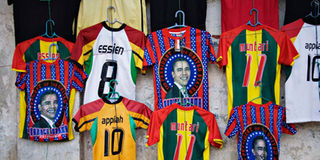There’s more than democracy in Obama’s Ghana visit

Memorial shirts depicting the likeness of United States President Barack Obama hang alongside national football team replica jerseys at a street-side kiosk in Ghana's capital, Accra July 7, 2009. REUTERS
NEW YORK, Wednesday
The White House is touting Ghana’s democratic development as the main incentive for the two-day visit by President Barack Obama that commences on Friday.
But controversial or delicate matters – such as the US Africa Command (Africom), narcotics trafficking and Ghana’s oil deposits – will almost certainly be on the agenda for the US leader’s talks with Ghanaian President John Atta Mills.
Gerald LeMelle, head of an advocacy group in Washington, is among critics of President Obama’s emerging Africa policy who suspect that military and resource considerations factor into the choice of Ghana as the African-American president’s first destination in black Africa.
“There are rumblings that the real reason the administration chose Ghana is two-fold: Ghana’s discovery of oil in 2008 and perhaps more importantly, the geographically, economically, and politically strategic advantage of establishing Africom’s headquarters there,” Mr Lemelle, the director of the Africa Action NGO, said earlier this week.
Expressed alarm
US officials have expressed alarm over West Africa’s growing role in the global narcotics trade. And Africom is being used to combat drug trafficking in Ghana and other countries in the region.
“It is absolutely shocking what has happened – the increase in drugs,” Mary Carlin Yates, Africom’s civilian deputy, said in Ghana during a visit in March.
Ms Yates, a former US ambassador to Ghana, held talks with the country’s defence chief as part of Africom’s outreach to selected governments in Africa.
Africom is building a “screening facility” in Ghana, Mr William Weschsler, a Pentagon official focused on combating the drug trade, told the US Senate last month.
Africom is providing drug-detection equipment for Ghana’s international airport as part of a security and surveillance initiative that also involves the US Defence Intelligence Agency and American naval forces off the West African coast.
One offshore field
US officials deny that they seek to base troops in Africa. During a visit to Ghana in 2008, then-President George W Bush called such suggestions “baloney.”
Ghana is meanwhile expected to begin exporting oil next year. That development could heighten US reliance on oil from West Africa, which currently accounts for 16 per cent of US oil imports. Ghana’s deposits may prove substantial.
The International Monetary Fund has estimated that government revenues from oil and gas could total $20 billion over the next 20 years from one offshore field that contains a projected 1.8 billions of crude oil.
Ghana also ranks as Africa’s number-two gold producer, behind South Africa.
In addition to the attention being paid to Ghana by Africom, the Obama administration is bolstering US military relations with the country by seeking funding increases for military training and weapons-purchase programmes.
President Obama has asked the US Congress to provide $850,000 in military training funds for Ghana in the coming year, compared to $650,000 allocated this year. Financing for Ghana’s weapons purchases from the US is similarly slated to increase – from $300,000 to $450,000.
The US has also been providing substantial sums of non-military aid to Ghana in recent years.
Ghana was approved in 2006 for what was then the largest development grant awarded through Washington’s Millennium Challenge programme. The $547, five-year allocation comes in addition to nearly $60 million in health spending that the Obama administration has proposed for Ghana in the coming year.


